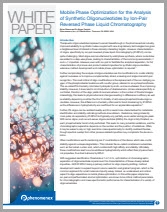Challenges and Solutions for Ion-Pair Reversed Phase Liquid Chromatography Method Development
Analyzing synthetic oligonucleotides presents unique challenges due to their complex structures and modifications, such as phosphorothioate linkages and ribose alterations. These features can cause difficulties like band broadening, inconsistent separations, and limited ionization efficiency in ion-pair reversed-phase liquid chromatography (IP-RPLC). Environmental factors, analyte impurities, and inadequate method optimization further complicate the process.
This whitepaper outlines solutions centered on mobile phase optimization, emphasizing the importance of selecting appropriate ion-pairing agents and acidic modifiers. These insights enable researchers to achieve better impurity profiling, improve sensitivity, and meet stringent regulatory thresholds.
Download the whitepaper to learn about thoughtful method development to address the complexities of synthetic oligonucleotide purification and analysis.


